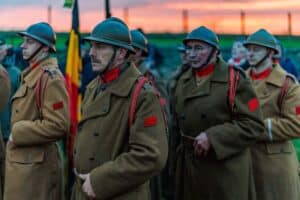Germany does not usually mark the anniversary of the Nazis' unconditional surrender to the Allies with much fanfare. This year however the city of Berlin declared a one-off public holiday on Friday.

The world must draw lessons from the past and work together to beat the coronavirus pandemic, European leaders urged as the continent marked 75 years since the end of World War II in Europe.
With parades and commemoration events cancelled or scaled down as part of measures to contain the outbreak, Europe and the United States marked the victory over Nazi Germany in sombre mood.
In Berlin, German President Frank-Walter Steinmeier and Chancellor Angela Merkel kept their distance as they paused in front of wreaths at Neue Wache — the country’s main memorial to the victims of war and dictatorship.
The end of World War II, today 75 years ago, was a day of liberation, also for us Germans.#TagDerBefreiung
We mourn the victims of war and terror and oppression, including so many South Africans who bravely fought for freedom and against fascism, and vow the #NeverAgain https://t.co/jANJohIoOA
— Martin Schäfer (@AmbSchaefer) May 8, 2020
Steinmeier then delivered an outdoor speech calling on nations to remember how they joined forces to fight the tyranny of Nazism and said the same unity was needed to defeat a virus that has killed over 270,000 people.
“For us Germans, ‘never again’ means ‘never again alone’,” he said.
“We want more, not less cooperation in the world — also in the fight against the pandemic.”
In Britain, one of the countries hardest hit by the virus in Europe, Prime Minister Boris Johnson also drew wartime parallels with the battle against the pandemic.
“On this anniversary, we are engaged in a new struggle against the coronavirus which demands the same spirit of national endeavour that you exemplified 75 years ago,” he said in a letter to veterans.
The Red Arrows fly over London to mark #VEDay75https://t.co/LcZZOOqeNO pic.twitter.com/BmAnwbS2Hg
— BBC News (UK) (@BBCNews) May 8, 2020
Britain’s famed Red Arrows performed a flypast over central London, trailing red, white and blue smoke while broadcasters marked a nationwide two minutes of silence.
Queen Elizabeth II will make a televised address to the nation at 9pm, the same time that her father, king George VI, gave a radio address marking VE day in 1945.
The muted commemorations come as the continent grapples with its biggest crisis since World War II — this time an invisible enemy that has sickened more than 3.8 million worldwide.
In Paris, French President Emmanuel Macron attended a small ceremony at the Arc of Triumph on a near-deserted Champs-Elysees.
Yes we can.@EmmanuelMacron @enmarchefr@Renaissance_UE@RenewEurope
pic.twitter.com/1hPJEflNgA
— E. Macron World (@MacronWorld) May 7, 2020
In the US, President Donald Trump and his wife Melania will join a wreath-laying ceremony in Washington, DC.
Russian President Vladimir Putin, whose country celebrates Victory Day on May 9, recorded a special video message for the Austrian people to mark the anniversary, wishing them “happiness, peace and prosperity”.
The message, broadcast on Austrian TV, also touched on the Covid-19 crisis.
“We are all fighting against this epidemic and mutual support is very important at this difficult time,” Putin said.
Russia had originally planned a huge military display on its May 9 Victory Day, with world leaders including Macron on the guest list.
But now only a flypast will take place over the Red Square in Moscow, as the country becomes Europe’s new hotspot of coronavirus infections.
Putin will on Saturday lay flowers at the Tomb of the Unknown Soldier memorial before making a TV address.
Germany does not usually mark the anniversary of the Nazis’ unconditional surrender to the Allies with much fanfare.
This year however the city of Berlin declared a one-off public holiday on Friday.
President Steinmeier urged Germans to see May 8 as “a day of gratitude” because it freed Germany from the terror of the Nazis and brought peace to Europe.
“Today, we Germans are allowed to say: the day of liberation is a day of gratitude!” Steinmeier said.
“It has taken three generations for us to wholeheartedly acknowledge this.”
Steinmeier’s words evoked a watershed speech by former president Richard von Weizsaecker who in 1985 first urged Germans to remember May 8 not as a day of defeat, but of liberation from the Nazi terror.
It comes at a time when anti-Semitism is on the rise again in Germany, where the far-right has railed against the country’s atonement for its Nazi past.
Alexander Gauland, a top figure in the far-right AfD party, slammed a public discussion about whether to make May 8 a permanent, nationwide public holiday, describing it as a “day of complete defeat” for Germany.
Josef Schuster, president of the Central Council of Jews, said Gauland’s view of the anniversary was typical of “neo-Nazis”.
“The intention is to portray the Germans primarily as victims. I find this distortion of history and relativisation of Nazi crimes irresponsible,” Schuster told the daily Neue Osnabruecker Zeitung.
For more news your way, download The Citizen’s app for iOS and Android.






